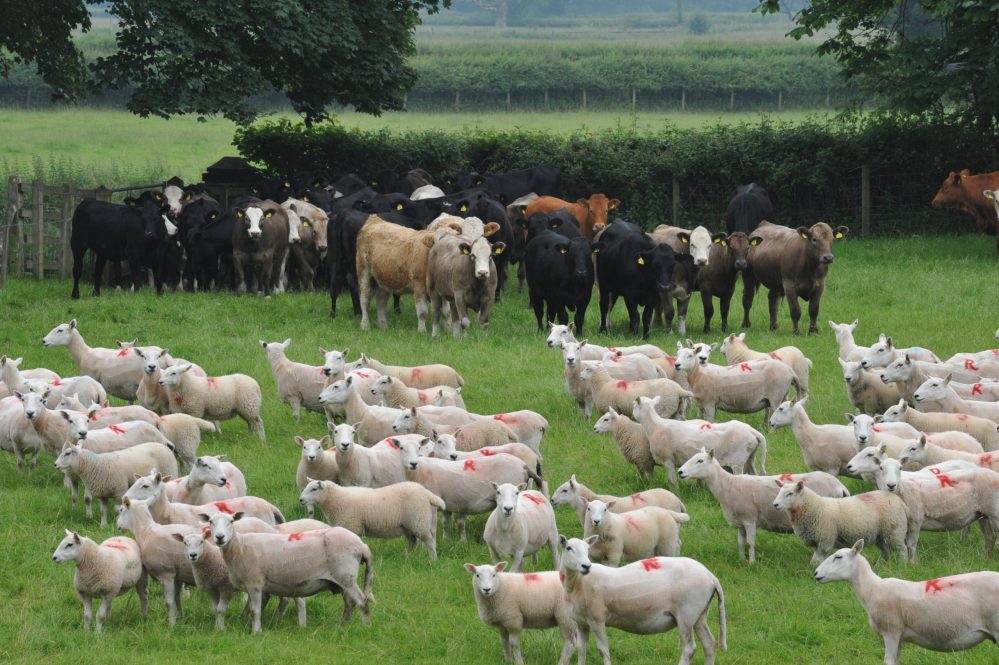Farming
Greater flexibility on Sustainable Farming Scheme needed – report

THE LARGEST ever cross-party Senedd investigation into the needs of the rural economy has published a landmark new report, setting out a robust and ambitious blueprint for the Welsh countryside.
The Senedd Cross Party Group (CPG) for Rural Growth’s report, Generating Growth in the Rural Economy: an inquiry into rural productivity in Wales, is making a series of low-cost recommendations across infrastructure and connectivity; housing and planning; tourism; and food and farming which, if implemented, could unleash the potential of Wales’ rural economy.
It follows the most comprehensive inquiry ever to be conducted by a cross party Senedd group into the needs of the rural economy. The CPG took evidence from major business groups, employers, unions and others to produce the report, with the Country Land and Business Association (CLA) acting as the secretariat. It will be officially launched at an event at the Senedd at noon today (5 March).
Productivity in Wales as a whole is 16% lower than the UK average, while workers in rural Wales are up to 35% less productive than in urban areas (output £18,000 per capita versus £28,000).
The report sets out a total of 19 low-cost, non-partisan and tangible recommendations which would help the Welsh government address this divide, and match the ambition of its rural communities.
Key asks and solutions developed by the group include:
- The re-establishment of a Rural Development Board (RDB) in conjunction with key stakeholders, to act as a focal point for facilitating rural growth, sensitive to sub-regional zones.
- The RDB to set out a definitive rural development strategy, setting objectives for infrastructure development, connectivity and rural skills and have the powers and resources to deliver it.
- A raft of measures to enable the planning consent system to become an enabler for responsible growth: reviewed local authority local development plans (LDPs), more planning officers to accelerate and improve the planning process, and the introduction of the positive approach of Planning in Principle to enable investment to be made and development to take place.
- Urgency in adopting the actions stemming from the Relieving pressures on SACs river catchments to support delivery of affordable housing programme led by the First Minister.
- Measures to revitalise the rural tourism industry: Visit Wales to become an arms-length body with resources comparable to equivalents in other parts of the UK, the body should include representatives from the sector. Impact assessments must be undertaken of recent fiscal initiatives and appropriate exemptions should be made to the 182-day threshold for business tax on tourist accommodation.
- A review of the terms – and clarity of the funding rates – within the proposed Sustainable Farming Scheme (SFS) to ensure it can continue to support this fundamental pillar of the rural economy is truly sustainable. The recommendation includes a demand for greater flexibility on the proposals to commit farms to 10% cover of trees and habitats.
Iain Hill-Trevor, Chair of CLA Cymru which represents thousands of farmers, landowners and rural businesses across Wales said: “For too long, the Welsh Government has treated rural Wales as a museum, to be preserved for the enjoyment of visitors.
“Instead, Ministers should view the countryside as a source of future growth and prosperity, creating jobs and opportunity while still preserving its inherent beauty.
“Wales needs to generate economic growth and good, skilled new jobs. Both can be delivered by delivering on the recommendations within this report.”
Samuel Kurtz MS, Chair of the CPG, said: “Rural Wales plays a key role in the future prosperity of our nation, but its potential will only be realised if policy makers and government understand its unique nature and needs.
“This cross-party report has taken evidence from a range of sectors throughout Wales, drawing on experiences of those living and working in rural Wales. The recommendations put forward are non-partisan but can act as a catalyst to simulate sustainable growth in our rural economy.
“I’m excited that this is the first report of its kind in the Senedd and I hope whomever is Wales’s new First Minister takes these recommendations seriously, to deliver for rural Wales.”
Margaret Bardsley has been running a small holiday lettings business near Welshpool, Mid Wales, since 2009. She said: “I welcome this report into rural productivity and growth in Wales.
“Furnished holiday accommodation providers have been hit with repeated body blows which have had a major impact both on demand and supply.
“To consider introducing a tourism levy and a licensing scheme right now is truly rubbing salt into the wounds, while the 182-night rule will increase the number of owners selling up, often way beyond the price range of those seeking affordable housing.
“My guests spend a lot of money in the local shops, pubs and restaurants, supporting jobs in the rural economy. If the Welsh government backed rural businesses and helped address the urban-rural productivity divide it would really make a difference.
“Rural businesses are dynamic and forward-thinking, and we’re ready to work with the government to help unleash the potential of the rural economy.”
Farming
Forgotten meats tipped as future ‘superfood’ comeback

SO-CALLED “forgotten meats” such as liver, heart and kidneys could soon find their way back onto dinner plates, with scientists suggesting they may offer a cheap, sustainable and highly nutritious alternative to modern ultra-processed foods.
Offal was once a staple of everyday diets across the UK, particularly in working-class households, but has steadily fallen out of favour in recent decades despite being rich in iron, protein and essential vitamins.
Now researchers at Aberystwyth University are working with Hybu Cig Cymru (HCC) to understand why demand has dropped and whether these cuts could be repositioned as affordable “superfoods”.
Scientists say that when nutrient-dense parts of the animal go uneaten, valuable food is effectively wasted.
Dr Siân Mackintosh, from the university’s Institute of Biological, Environmental and Rural Sciences (IBERS), said these meats could play an important role in healthier and more sustainable diets.
“Where they are not being used, these nutrient-dense ‘forgotten meats’ represent a significant loss of nutrients from our food chain,” she said. “Incorporating them as part of a balanced diet could support human health while also reducing food waste and improving environmental outcomes.”
Taste tests win over public
To test public attitudes, HCC staff have been running tasting sessions at major agricultural events including the Royal Welsh Show and the Winter Fair in Llanelwedd.
Visitors sampled dishes made with Welsh lamb’s liver, including stroganoff, traditional faggots and pâté. Organisers say many people were surprised by the flavour and keen to learn how to cook them at home.
Dr Eleri Thomas, Future Policy and Project Development Executive at HCC, said interest was stronger than expected.
“We believe there is significant potential for these forgotten meats to be incorporated back into our diets,” she said. “Consumers liked the flavour and wanted recipes and cooking tips, as well as understanding the nutritional value.”
She added that making better use of undervalued cuts could improve sustainability across the meat supply chain while creating new marketing opportunities for Welsh producers.
Part of wider sustainability project
The work forms part of the SMART Nutrient Cymru project, funded through the Welsh Government’s innovation support scheme.
Project lead Dr Christina Marley said the aim is to capture nutrients currently being lost across the agri-food system.
Alongside the collaboration with HCC, the team has also partnered with Dŵr Cymru Welsh Water on land management to protect rivers, and with British Wool to explore new uses for fleece by-products.
IBERS itself is one of eight UK research institutes strategically supported by Biotechnology and Biological Sciences Research Council, providing national expertise in grassland and plant breeding science.
Researchers say that with food prices rising and pressure growing to reduce waste, traditional nose-to-tail eating could offer both economic and environmental benefits.
Image: Welsh lamb faggots (Pic: HCC)
Community
Celebrating nature recovery through Cysylltu Natur 25×25

A CELEBRATION event was held on Saturday, January 24 in Cwm Gwaun to mark the achievements of Pembrokeshire Coast National Park Authority’s Cysylltu Natur 25×25 project, bringing together volunteers, farmers and staff involved in delivering nature restoration across North Pembrokeshire.
The landscape-scale project was funded by the Welsh Government through the Nature Networks Programme, delivered by the Heritage Fund. The Programme aims to strengthen ecological connectivity and resilience by restoring habitats at scale.
Those attending the event heard about the wide range of conservation activity delivered through the project across the north of the National Park. This has included practical works to restore grazing to Rhos pasture to benefit marsh fritillary butterflies and southern damselflies, specialist work to conserve rare lichens, volunteer chough, dormouse and harvest mouse monitoring, safeguarding greater horseshoe bat hibernation sites, and targeted action to tackle invasive species threatening important sites.
Volunteers, farmers, land managers and contractors played a vital role in the success of the project, contributing local knowledge, practical skills and ongoing commitment to caring for Pembrokeshire’s unique landscapes and wildlife in the long term.
Mary Chadwick, Conservation Officer for Pembrokeshire Coast National Park Authority, said: “Cysylltu Natur 25×25 has shown what can be achieved when farmers, volunteers and conservation specialists work together with a shared aim.
“From monitoring some of our most elusive species to restoring and protecting habitats, the dedication of everyone involved has made a real difference for nature across the National Park.”
Although the Cysylltu Natur 25×25 project is now coming to an end, the important work it has supported will continue. Building on its successes, Pembrokeshire Coast National Park Authority will carry this momentum forward through the next phase of nature recovery work under NNF4 Cysylltiadau Naturiol / Naturally Connected, ensuring ongoing protection and enhancement of habitats for future generations.
Farming
Judicial review granted for hundreds of farmers and landowners in Wales

OVER three hundred Welsh farmers and landowners have been granted the right to legally challenge Green GEN Cymru’s ‘unlawful behaviour’ at the High Court.
The collective filed a judicial review application on behalf of the community groups, Justice for Wales and CPRW, on four separate grounds, including claims that the energy company has acted unlawfully and with disregard for biosecurity and the environment, while trying to gain access to private land to conduct surveys for three major overhead pylon routes.
The proposal will see the energy infrastructure and pylons spanning 200 km across Powys, Ceredigion, Carmarthen, and Montgomeryshire in Wales and across the Welsh border into Shropshire, in the West Midlands of England.

Mrs Justice Jefford granted permission on four grounds – including abuse of power and procedural impropriety – during the three-and-a-half-hour hearing at Cardiff Civil Justice Centre on Tuesday, January 20.
A two-day hearing is expected to take place in April 2026, date to be confirmed.
The judge also accepted an undertaking from Green GEN Cymru that it would not enter land using s.172 powers – the right given to acquiring authorities to enter land to conduct surveys or valuations under the Housing and Planning Act 2016 – until an urgent interim relief application hearing can be held.
Natalie Barstow, founder of Justice for Wales, said: “This is a moment of vindication. For months, we have been left feeling unsafe in our own homes and stripped of our power as farmers and landowners.
“This is not a protest against renewable energy; this is about standing up for what is right. Our right to dignity and to have a voice, and for the future of our land, wildlife, and livelihoods.
“Since we began this battle, hundreds of other farmers and landowners across Wales have come forward with similar stories, and we’ve been supported by many generous donations to fund the legal challenge. We knew we weren’t alone in our concerns, but the response demonstrates it is a far wider issue than we initially feared, and why it is so important that Green GEN’s conduct and protocols are properly scrutinised.
“We said we will not be bullied into submission, and this judgment is just the first foot forward in our fight for justice.”
Mary Smith, a lawyer at New South Law, the law firm representing the impacted communities, said: “Holding acquiring authority status does not entitle a company to disregard the limits of its statutory powers or the rights of the people affected.
“The Court’s decision confirms that Green GEN Cymru must be held to the same legal standards as any other public body when exercising intrusive powers over private land. This case is about restoring fairness, accountability, and respect for the communities whose livelihoods and environments are at stake.”
-

 Crime2 days ago
Crime2 days agoSex offender jailed after living off grid in Pembrokeshire and refusing to register
-

 Health1 day ago
Health1 day agoHealth board targets rise in steroid and gym drug use across west Wales
-

 News4 days ago
News4 days agoPrincess of Wales visits historic Pembrokeshire woollen mill
-

 Health5 days ago
Health5 days agoDoctor struck off after sexual misconduct findings at Withybush Hospital
-

 Crime1 day ago
Crime1 day agoTeacher injured and teenager arrested for attempted murder at Milford Haven School
-

 Education6 days ago
Education6 days agoIndustry insight helps marine cadets chart career course
-

 Crime3 days ago
Crime3 days agoHakin man’s appeal delayed again as Crown Court seeks guidance on insurance law
-

 News5 days ago
News5 days agoHerald journalists to feature in true-crime documentary on local lockdown murder


























